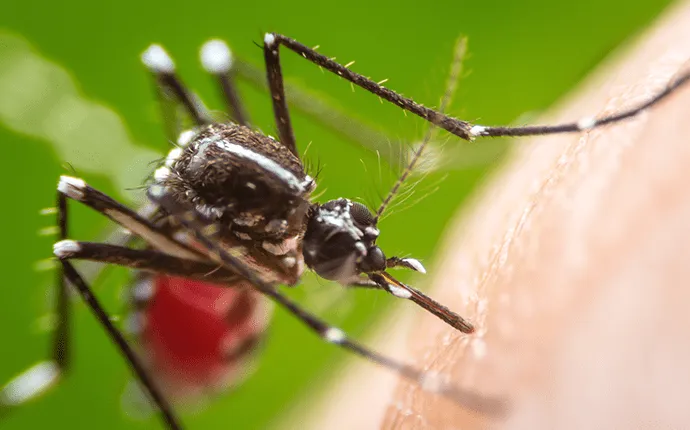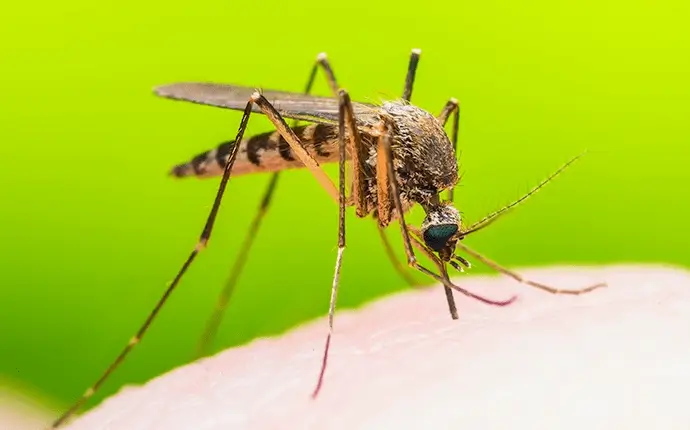
Full List of Diseases Mosquitoes Carry in North Carolina
Mosquitoes are a pain, in the literal sense and the figurative sense as well. But painful, itchy wounds on the skin aren't the only threat mosquitoes pose. They can also be vectors for several human diseases. Check out what diseases mosquitoes carry in North Carolina as well as a few tips to ease the itch.

Table of Contents
Types of Mosquito-Borne Diseases
According to the CDC, mosquitoes can transmit a variety of diseases, which most commonly include:
- Zika Virus
- West Nile Virus
- Malaria
- Dengue Fever
- Chikungunya
- Yellow Fever
Keep in mind that this list applies worldwide, and some of these diseases are not a real concern unless you are traveling outside of the United States. Regarding the diseases mosquitoes carry in North Carolina, the main threats that pose a risk are currently the Zika Virus and West Nile Virus.
1. Zika Virus: Diseases Mosquitoes Carry in North Carolina
We've heard a lot about the Zika virus in years past and for good reason. Studies have shown that Zika can cause microcephaly in unborn children at all stages of pregnancy. Fortunately, cases of Zika-related microcephaly in the United States are low.
Symptoms of the Zika Virus:
- Fever: Many people with Zika virus infection experience a mild fever.
- Rash: A distinctive rash is often a key symptom, featuring red spots with or without itchiness. It typically starts on the face and then spreads to other parts of the body.
- Joint Pain: Joint pain, also known as arthralgia, is a common symptom and can be quite uncomfortable.
- Conjunctivitis: Some individuals may develop redness and irritation of the eyes, known as conjunctivitis or "pink eye."
- Muscle Pain: Muscle pain, or myalgia, can accompany Zika infection.
- Headache: Many people experience mild to moderate headaches.
- Fatigue: Feeling tired and weak is a common symptom.
It's important to note that the symptoms of Zika virus infection are usually mild and self-limiting, lasting for several days to a week. However, the Zika virus can have serious consequences for pregnant women, as it can be transmitted from mother to fetus and cause birth defects such as microcephaly, a condition characterized by an abnormally small head and underdeveloped brain.
Zika can also cause issues for adults. Outbreaks of Guillain-Barre syndrome have been linked to this virus. This is a rare disorder that is often preceded by a respiratory infection and can cause a weakness in the body and result in paralysis of the limbs.
While Zika is certainly a virus to be cautious of, it isn't the worst of the diseases mosquitoes carry in North Carolina...
2. West Nile Virus: Diseases Mosquitoes Carry in North Carolina
The most widespread of the diseases mosquitoes carry is the West Nile Virus. It has a distribution that has touched every state in the U.S.
Symptoms of the West Nile Virus:
Not only is it widely distributed, but it is also an illness that can be deadly. Equally as chilling, West Nile Virus (WNV) may remain asymptomatic.
When symptoms do occur, they can vary in severity. Early symptoms are similar to the flu (headaches, fever, body aches, fatigue, nausea, vomiting) but, as the illness progresses, it has the potential to cause internal organs to shut down.
Often, encephalitis (swelling of the brain) is associated with these viruses. There are also distinct encephalitis diseases such as Eastern equine encephalitis, LaCrosse encephalitis, Eastern equine encephalitis, St. Louis encephalitis, and more.
Here are common symptoms of West Nile Virus, one of the diseases mosquitoes carry in North Carolina:
- Fever: Many people with WNV infection experience a sudden onset of fever.
- Headache: Severe headaches are a frequent symptom of WNV.
- Fatigue: Feeling tired and lethargic is common.
- Body Aches: Muscle and joint pain can occur.
- Skin Rash: Some individuals may develop a rash, which is typically mild.
- Swollen Lymph Nodes: Lymph nodes, particularly in the neck and groin, may become swollen.
- Eye Pain: Redness and eye pain, often due to inflammation of the optic nerve, can occur in some cases.
- Nausea and Vomiting: Gastrointestinal symptoms like nausea and vomiting may occur.
It's important to note that in severe cases, West Nile Virus infection can lead to neurological symptoms, such as:
- Meningitis: Inflammation of the membranes surrounding the brain and spinal cord.
- Encephalitis: Inflammation of the brain, which can lead to confusion, seizures, and other neurological symptoms.
- Paralysis: In rare instances, WNV can cause muscle weakness or paralysis, which can be long-lasting or permanent.
When mosquitoes come into our North Carolina homes, they have the potential to do more than plague us with itchy bites. If you're noticing unusual spikes in flu-like illness, seek medical attention. While most people with West Nile Virus recover fully, severe cases can be life-threatening, and prompt medical care is crucial.
Preventative measures, such as avoiding mosquito bites, are also important in areas where WNV is prevalent. That is why every resident should consider a residential pest control program that includes mosquito control that includes mosquito treatments and mosquito prevention services.
3. Malaria
Most U.S. citizens have heard of malaria. This virus is linked to the deaths of more than a million people worldwide every year. But, in the United States, we've only had isolated outbreaks. So, while this is one of the many diseases mosquitoes carry, it's also not a commonly transmitted virus in the States.
Symptoms of Malaria:
Malaria can lead to a wide range of symptoms, which may vary in severity. The symptoms of malaria typically occur in cycles and can be categorized as follows:
- Cold Stage: This is the initial phase, which lasts for about 15-60 minutes. It includes symptoms such as chills and shivering.
- Hot Stage: Following the cold stage, a high fever develops, often reaching up to 104°F (40°C) or higher. This stage may last 2-6 hours and is accompanied by profuse sweating.
- Sweating Stage: As the fever subsides, the person experiences intense sweating, often leading to drenching the bedclothes.
- Fatigue: Malaria can cause extreme fatigue and weakness, which can persist for days or weeks.
- Headache: Severe headaches are common during a malaria infection.
- Muscle and Joint Pain: Aches and pains in the muscles and joints are typical symptoms, often described as similar to the flu.
- Nausea and Vomiting: Gastrointestinal symptoms like nausea and vomiting can occur.
- Abdominal Pain: Some individuals with malaria experience abdominal pain and discomfort.
- Diarrhea: Diarrhea may occur, particularly in severe cases or with certain species of the Plasmodium parasite.
- Anemia: Prolonged or severe malaria infections can lead to anemia, which can cause weakness and paleness.
- Jaundice: In severe cases, malaria can affect the liver and lead to jaundice, characterized by yellowing of the skin and eyes.
4. Dengue Fever
Mosquitoes, particularly the Aedes aegypti mosquito, are the primary vectors responsible for transmitting Dengue Fever. These types of mosquitoes primarily live in tropical and subtropical regions, so it's of less concern for those living in Western North Carolina.
Symptoms of Dengue Fever:
- High fever: Sudden and high-grade fever, often reaching up to 104°F (40°C).
- Severe headache: Intense and persistent headaches, often described as a "breakbone" sensation.
- Joint and muscle pain: Severe joint and muscle pain, which is why Dengue Fever is sometimes called "breakbone fever."
- Rash: A rash may develop within a few days of the onset of fever, typically appearing on the face, limbs, and torso.
- Fatigue and weakness: Dengue Fever can lead to extreme tiredness and weakness.
- Pain behind the eyes: This symptom, known as retro-orbital pain, can be particularly bothersome.
- Nausea and vomiting: Some individuals with Dengue Fever may experience gastrointestinal symptoms like nausea and vomiting.
- Mild bleeding: In some cases, individuals may have minor bleeding from the nose or gums, or experience easy bruising.
5. Chikungunya
Chikungunya is a viral infection primarily transmitted to humans through the bite of infected Aedes mosquitoes. In the continental United States, Chikungunya cases have primarily been the result of people traveling to countries in the Caribbean, Central America, South America, or other regions where the virus is endemic, getting infected there, and then returning to the U.S. with the virus.
Symptoms of Chikungunya:
The symptoms of Chikungunya typically appear 3 to 7 days after being bitten by an infected mosquito and may include:
- Fever: Chikungunya often begins with a sudden and high fever, which can exceed 102°F (39°C).
- Severe Joint Pain: One of the hallmark symptoms is severe and debilitating joint pain, which can affect multiple joints. The pain can be excruciating and may last for weeks to months. It is often accompanied by swelling.
- Muscle Pain: Many individuals with Chikungunya experience muscle pain, which can be intense.
- Headache: Headaches are common and can be severe in some cases.
- Fatigue: A feeling of extreme tiredness and weakness is often present.
- Skin Rash: A rash may develop, which can vary in appearance but is typically characterized by redness and itching. The rash may affect the trunk, limbs, and face.
- Nausea and Vomiting: Gastrointestinal symptoms like nausea and vomiting may occur.
- Swelling: Swelling of the hands, feet, or other joints may be observed.
- Conjunctivitis: In some cases, individuals with Chikungunya may develop redness and irritation of the eyes.
While Chikungunya is rarely fatal, the joint pain and other symptoms can be severely debilitating, affecting a person's quality of life for an extended period. Treatment primarily involves relieving symptoms with rest, pain relievers, and fluids. Preventative measures, such as mosquito bite prevention (using insect repellent, wearing long sleeves and pants, and staying in air-conditioned or screened-in areas), are essential to avoid contracting the virus, especially in regions where Chikungunya is endemic.
6. Yellow Fever
Yellow fever is one of the viral diseases mosquitoes carry. It's primarily found in certain regions of tropical and subtropical Africa and South America. These regions are considered endemic for yellow fever, meaning that the virus is consistently present and can cause outbreaks.
The symptoms of yellow fever can vary in severity and typically occur in two stages:
1. Acute Stage (Early Symptoms):
- Fever: Sudden onset of a high fever, often exceeding 101°F (38.5°C).
- Headache: Severe and persistent headaches are common.
- Muscle Pain: Muscular aches and pain, particularly in the back and knees.
- Chills and Shivers: Intense chills and shivering can accompany the fever.
- Fatigue: Profound weakness and fatigue.
- Nausea and Vomiting: Gastrointestinal symptoms such as nausea and vomiting may occur.
- Loss of Appetite: A decreased desire to eat.
2. Toxic Stage (Severe Symptoms):
- After a brief period of remission from the initial symptoms, some individuals progress to the severe or toxic stage of yellow fever, which can be life-threatening. This stage is characterized by:
- Jaundice: Yellowing of the skin and eyes due to liver damage. Jaundice is a hallmark symptom of severe yellow fever.
- Hemorrhage: Bleeding can occur from various parts of the body, leading to nosebleeds, gum bleeding, and bloody vomit.
- Organ Dysfunction: Yellow fever can cause damage to vital organs, including the liver and kidneys.
- Shock: In severe cases, yellow fever can lead to shock, a state of circulatory failure.
- Multi-Organ Failure: The disease can result in the failure of multiple organ systems, which is often fatal.
It's important to note that not everyone infected with the yellow fever virus will progress to the severe stage of the disease. Many people experience only the mild symptoms and recover within a week or so. However, for those who do develop severe yellow fever, the condition can be life-threatening, and immediate medical attention is crucial.
Yellow fever can be prevented through vaccination, and it is recommended for individuals traveling to or residing in areas where the virus is endemic. Additionally, mosquito bite prevention measures, such as using insect repellent and wearing protective clothing, are important in regions where yellow fever is a risk.
Transmission of Diseases Mosquitoes Carry in North Carolina
Mosquitoes are vessels for transmitting a wide range of diseases, making them one of the deadliest creatures on the planet. But how do mosquitoes transmit diseases?
- Female Mosquitoes Feed on Blood: Female mosquitoes are the only ones who feed on blood as food. That said, the disease transmission process begins when a female mosquito pierces the skin of a human or animal host.
- Saliva Injection into the Blood Stream: During her feeding, mosquitoes introduce saliva into the host's bloodstream to prevent clotting - it's in this exchange that disease transmission occurs. The saliva of an infected mosquito can contain the pathogens responsible for various diseases. When the mosquito feeds on an infected host, it ingests the pathogens along with the host's blood. These pathogens then multiply and replicate within the mosquito's body.
- Mosquito Spreads to Organisms while Feeding: When the infected mosquito bites another human or animal, it injects these pathogens into the new host's bloodstream through its saliva, effectively transmitting the disease. The transmission of diseases by mosquitoes is a complex and efficient process, often leading to widespread outbreaks and significant public health concerns, particularly in regions where these diseases are endemic.

How to Treat Mosquito Bites
When dealing with mosquito bites, it is essential to start by washing the affected area with mild soap and water to clean the bite and reduce the risk of infection. To reduce swelling and numb the area, applying an ice pack or a cold compress wrapped in a cloth or towel can be helpful. Over-the-counter hydrocortisone cream or calamine lotion can provide relief from itching and minimize inflammation. Taking oral antihistamines like Benadryl or Claritin can also help reduce itching and allergic reactions.
It's important to resist the urge to scratch the bite, as scratching can worsen irritation and increase the chances of infection. Natural remedies such as a paste made of baking soda and water or aloe vera gel can be applied to soothe the itchiness. Keeping the bite area clean and dry is essential to prevent infection. If a mosquito bite becomes infected or shows signs of an allergic reaction, seeking medical attention promptly is recommended.
What Is a Virus Reservoir?
Virus reservoirs in the United States serve as crucial sources for the maintenance and propagation of diseases through mosquitoes. These reservoirs primarily consist of various animal species, such as birds, mammals, and reptiles, that harbor specific viruses without showing any signs of illness. Mosquitoes act as efficient vectors, feeding on infected animals and acquiring the viruses in the process. When these infected mosquitoes subsequently bite humans or animals, they transmit the viruses, leading to the spread of diseases.
For instance, in the case of arboviruses like West Nile virus and Eastern equine encephalitis virus, birds serve as important reservoirs, as mosquitoes feed on infected birds and then transmit the viruses to humans or other animals. Understanding and monitoring these reservoirs is crucial for disease surveillance and implementing effective control measures to mitigate the impact of mosquito-borne diseases in the United States.
Backyard Mosquito Prevention in North Carolina
At A-1 Pest Control, we bundle seasonal mosquito prevention and mosquito treatment services in our Home Shield Plus and Home Shield Complete pest control services. This gives our customers the mosquito prevention they need without breaking the bank. Home Shield Plus and Home Shield Complete include 8 scheduled treatments and year-round coverage for over 15 pests, including ticks, fleas, stinging insects, and mosquitoes. This is vital protection that every family should have.
Final Word: Diseases Mosquitoes Carry in North Carolina
If you live in Lenoir, Mooresville, Hickory, Blowing Rock, or the surrounding areas, let A-1 Pest Control guard your family from pest-borne diseases and protect your property from destructive pests. Our team is one of the best in the industry, having earned the QualityPro Seal of Excellence from the National Pest Management Association. This is a distinction that less than 3% of pest control companies can boast. That means you'll get quality service and effective pest control, every time.
